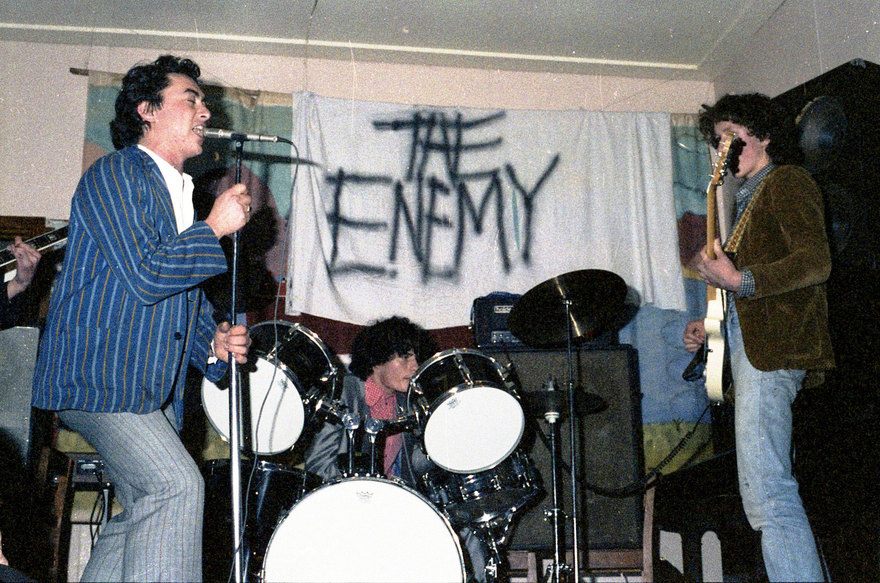
The Clean, 1978, at Beneficiaries Hall, Dunedin. Doug Hood (vocals), David Kilgour (guitar), Peter Gutteridge (bass), Hamish Kilgour (drums). - Photo by Jeff Batts
Alec Bathgate: everything sorted, calmly
My first memory of Doug Hood is at 94 Filluel Street in Dunedin, the house he rented with Chris Knox and their other flatmates. It would have been around August 1977. I had met Chris in a record shop a month or so earlier, and along with Mike Dooley, we were in the early stages of finding our feet as a band, practising in the front room at Filluel Street. By November we played our first gig as The Enemy at the Beneficiaries Hall, just down the hill from Chris and Doug’s place. We played there again a few months later when The Clean played ... with Doug on vocals.
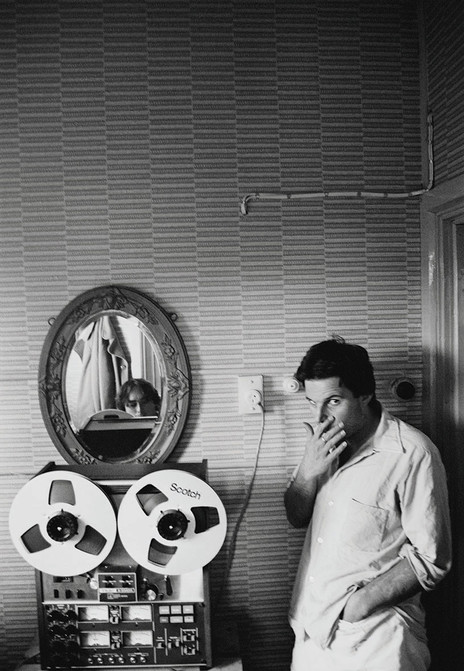
Chris Knox with Doug Hood in the mirror reflection, 1981. - Alec Bathgate
Chris and Doug had been friends for a few years and there was an ease between them that comes from shared experience and personal history. They were a bit older than Mike and I. We had both just turned 18 and must have seemed very green to them. I think they were probably amused by our naivety, but also looked out for us, our surrogate older brothers.
There was lots of driving over the next few years. Up and down and across the North and South Islands, and criss-crossing the suburbs of Sydney. I remember, in the carless days of 1979, Doug having the foresight to strategically hide tanks of petrol in a few roadside spots in anticipation of upcoming journeys so we could make it to gigs. And, another time, driving through the night with a broken passenger window, snow settling on Chris and I as we huddled under a blanket – much to Doug’s amusement on the sheltered driver’s side.
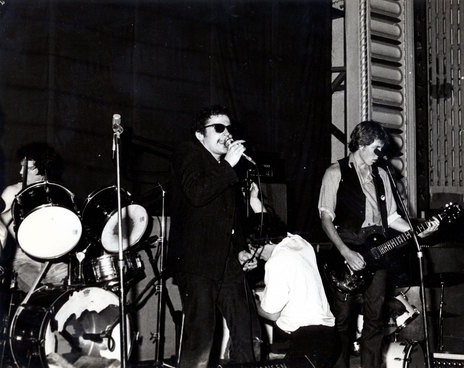
Toy Love late 1979. Soundman Doug Hood is repairing something. Mike Dooley, Chris Knox, Doug Hood and Alec Bathgate
I loved those days on the road as Doug drove us to the next venue, feeling free and full of purpose, and knowing everything would be alright because he had calmly taken care of it. Broken down vans got repaired, PAs were hired and setup, venue managers communicated with, late night food found, accommodation sorted, money distributed so we all had a few dollars in our pockets. And, not least, making us sound great from behind the mixing desk.
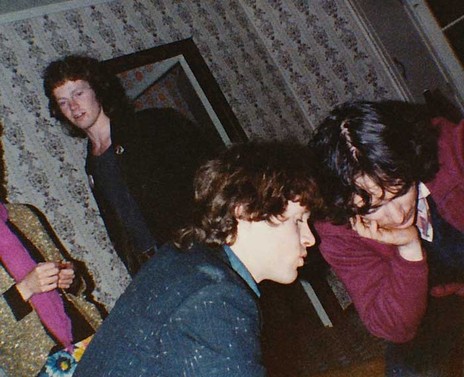
Toy Love in Sydney, 1980: Jane Walker (out of picture), Mike Dooley, Chris Moody and Doug Hood. - Photo by Carol Tippet
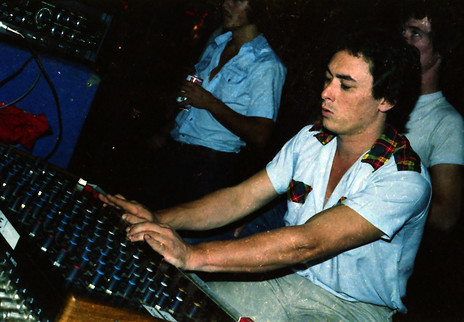
Doug Hood mixing Toy Love at the Stage Door, Sydney. - Carol Tippet
After Toy Love split up in 1980 Doug continued to live with Chris and I would see him whenever I was in Auckland to record (he sings background vocals on Tall Dwarfs’ ‘The Brain That Wouldn’t Die’). He organised a lot of our gigs, gave us some great support slots: John Cooper Clarke, John Cale. I caught up with him in London in the mid 80s when he was there with The Chills, and later when he passed through Christchurch on various tours. I always felt a huge amount of affection for him, but, of course, we never communicated those things back then. I feel fortunate our lives intersected and we got to share a few adventures together. And then a few decades pass by and through all these patchy memories and vague recollections.
David Kilgour: the Jessels
I turned 20 a few days before we recorded the Boodle EP with Doug and Chris. Some kind of peak period for all of us. For a while we called our Auckland whānau the Jessels. They lived on Jessel St, Grey Lynn. Whenever in Auckland we lived with the Jessels, had fun with the Jessels, planned shows, went to movies, even dropped acid, planned recordings, most likely drank Steinlager, swam naked in the harbour at 2am, planned music domination via the back door, loved music with the Jessels, ate with them, made videos with Jessels, had photo sessions with the Jessels ...
I was 17 when I met Doug in Dunedin around 1978. He is a Jessel. Barbara Ward, Liesha Ward-Knox and Carol Tippet are also Jessels. Soon after turning 17 I was in a van with The Enemy going to The Clean’s 3rd and 4th (?) show in Christchurch. Brother Hamish and schoolfriend Peter Gutteridge, The Enemy, Chris Moody and Doug, with at least two crates of warm Speights and a small amount of pot in a matt-black Transit van. No seats in back, from memory. They would soon own two Transits which seemed like a genius stroke, especially if one broke down, which would soon happen.
Most likely a Doug Idea, he was full of good sensible ideas. He also understood the artistic temperament, was most likely one himself. Yeah, mad but mad for it. Yeh mad, but utilising that energy. We would soon own our own Bedford van. Seems like pretty quick development looking back.
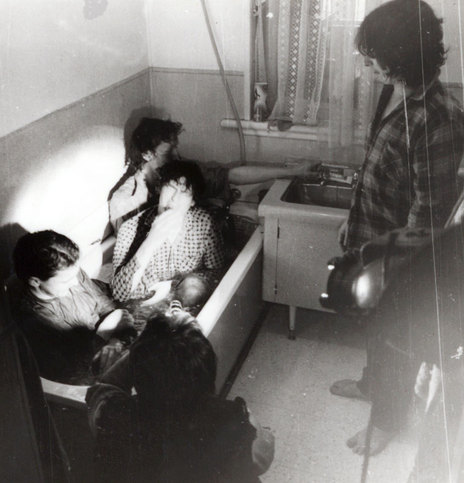
Doug Hood watches as Chris Knox films The Clean for Boodle Boodle Boodle, 1981. - Photo by Carol Tippet
In 1978, I still don’t think I knew any chords on guitar. We all thought we were onto something I’m sure. Songs were there straight away. There was no question, “Should we write our own songs?” Ripe for the picking. Doug sang with us for a show or two, just before The Enemy left for Auckland. We had him sing our lyrics like, “I’ve got a negative life, please save me from a negative life.” He could sing, probably perfect pitch. A kind, intelligent man, an ideas guy who sometimes actually pulled off some big ideas and probably why I was in a van going somewhere as a 17 year-old non-musician. Jeepers, I guess I’m touring.
He saw stuff. Yeah, enthusiastic Doug. You believed Doug, you wanted to believe Doug, as a young and a loopy kid. Yeah, Doug was kind of a parental figure to me, as were all the Jessels. Problem solver and hit maker. Doug and Chris have supported me ALL the way. Actually all The Enemy did and Doug was Enemy, as was Chris Moody.
My partner Genevieve got asked about “how great those early 80s days must’ve been …” Her answer was that it was really the late 70s and seeing it all come together in Dunedin which was the best period.
Yeah. From the start, without Doug it all would’ve been quite different. He’s the first person I met who knew how to put a PA together. Okay it was probably only two speakers and an amp, maybe three mics, but this was impressive stuff for a 17 year-old sponge mind. A “we can do this” guy. Without Doug, Flying Nun wouldn't have been quite the label it tried to be.
Blah blah blah, Iggy liked Doug, that’s enough alone ain’t it? John Cale liked Doug, ok? ... Doug made sure the Go-Betweens got their oysters or crayfish, welcomed John Lydon with pot and his fave reggae, got me an oxygen tank and mask for a show once after a night in hospital on drip from an asthma attack. That’s no easy feat.
Yes, life is Spinal Tap. This looks like weak writing about a big figure but it’s better than nothing. All the best to you, you deserve it Doug … xd
Paul Kean: family of bands
There was Doug at a Sunday night Mollett Street session in Christchurch when he sang with The Clean in 1978. He must have been around 24. I recall him humbly standing over on the left side of the stage wearing his striped jacket – the sort they had at some New Zealand high schools.
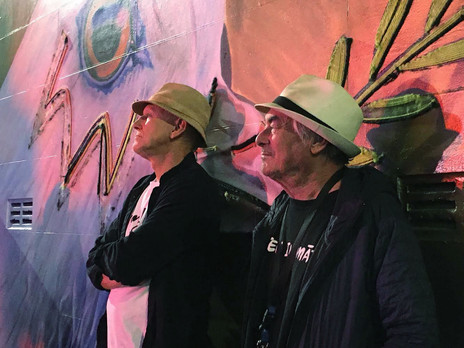
Doug Hood with Paul Kean. - Paul Kean collection
He was there with The Enemy – not on stage but part of the whole that made them tick. Driver, sound man, organiser. When Jane and I joined up with The Enemy in Auckland, as it evolved into Toy Love, Doug was there too. Always with enthusiasm, good ideas and support. He had an even temperament and a calming influence – he was one of the band, looking after us all through the Toy Love years.
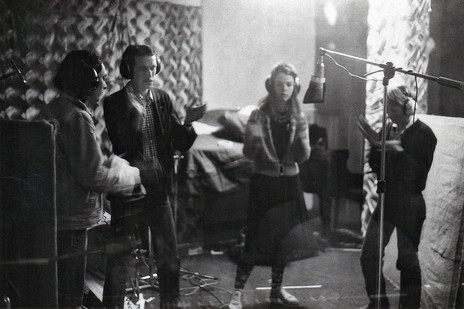
In Mandrill Studio recording handclaps for 'Squeeze' (L-R): Doug Hood, Terry Hogan, Jane Walker, Carol Tippet. - Photo Murray Cammick
Steering the ship from the helm of the mixing desk when we played live – projecting the right balance of power to our sound (I’ve heard rumours he even sang some backing vocals from the desk) – and also steering the wheel of his matt-black Ford Transit van, driving us from gig to gig around New Zealand.
Doug liked the steering wheel spinning knob, bottle of beer between his legs, and always getting us to our next destination on time.
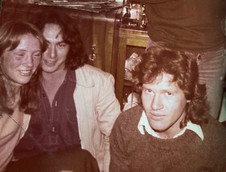
Doug Hood with Carol Tippet and Chris Moody. - Chris Moody Collection
He came to Australia with us along with fellow Toy Love crew members/family – Chris Moody, Ian Dalziel, Carol Tippet, Barbara Ward, and Georgina Trayhorne – investing his time like all of us, having faith/hope that one day we might be able to earn a living from what we were doing.
After the demise of Toy Love, Doug gave his support to Flying Nun and the family of bands in the formative 1980s years through recording and touring bands, Orientation and Looney Tours, Livesound – then producing Big Day Out and bringing many great bands to New Zealand.
Doug has shaped our New Zealand music scene through love and devotion and he is loved by many. Thank you Doug.
Don’t Ask Me: Doug Hood on Toy Love in Sydney
So there we were in Sydney. Despite some initial misgivings about the move to Australia it seemed so promising. A nice house, albeit a bit small, in trendy Paddington, next door to the Windsor Castle pub. There was a record company, an agent, a decent PA, and all we had to do was turn up and play. There would be plenty of gigs, per diems for the band and crew and the album to look forward to.
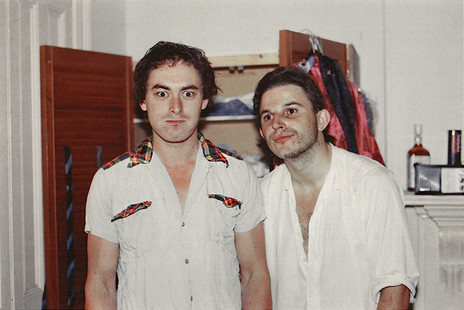
Doug Hood and Chris Knox in Toy Love's Sydney band flat, 1980. - Photo by Carol Tippet
We hardly ever saw the record company and the agent appeared to be promoting us as a favour for the record company’s owner, the “legendary” Michael Browning. The gigs were early week, inner-city wino hangouts, lunchtime university student bars or suburban leagues clubs, supporting “great” Ozzie bands like Mental As Anything. It turned out to be a real grind, especially the supports, playing to a handful of disinterested, sometimes hostile Oz rock fans.
The per diems never eventuated and if it wasn’t for Carol, Georgina and Barbara feeding us we’d probably have been back home within weeks. A brief, enjoyable visit to Melbourne just reinforced that Sydney was a mistake.
But we still had the album to look forward to …
– from the liner notes to Cuts, republished at Jane Walker’s Toy Love website
Terence Hogan: unflappable
For a few months through 1979-80 I saw a lot of Doug. He had come up to Auckland as road manager for the Dunedin band The Enemy, who morphed into Toy Love soon after. I became involved with Toy Love myself, initially as a fan and friend, leading to their connection with WEA Records where I worked. I was always struck by how unflappable and hard-working Doug was, completely dedicated to the band and to doing whatever was in the band’s interest. Through the hurly-burly of gigging around the city and clocking up untold kilometres on the road, the respect that the band members and those around Doug had for him was clear to me from the start, and remained so during the following months and the often frustrating period I shared with them in Australia.
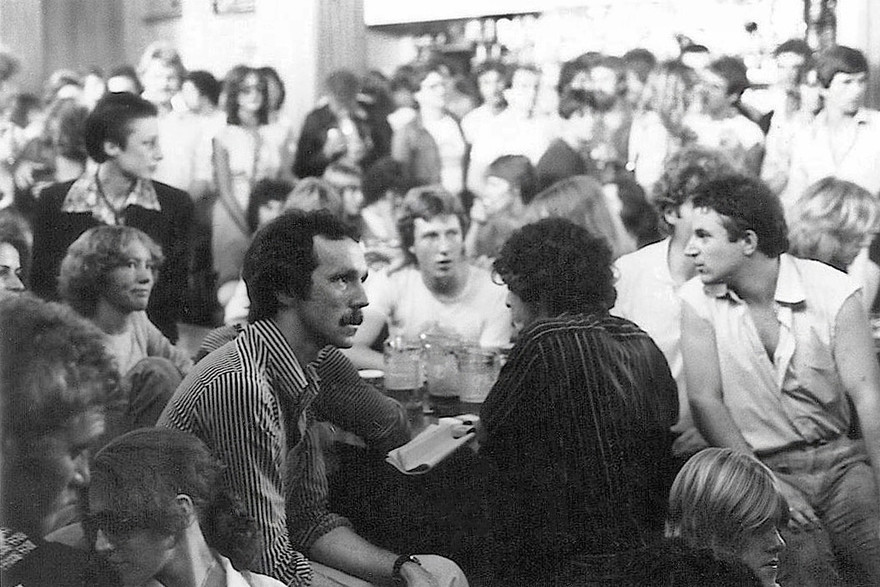
Terence Hogan, Alec Bathgate, Doug Hood, and Chris Knox, Windsor Castle, Auckland, c. 1979. - Photo by Murray Cammick
It was a given that Doug knew what he was doing and he got things done, and with good humour. These things included extracting drummer Mike Dooley from various scrapes and misunderstandings, like the threat of being physically thrown out of a venue that the band were about to play, because the manager didn’t like Mike’s boots and attitude. Mike says that “Doug intervened, as he did on many such occasions.”
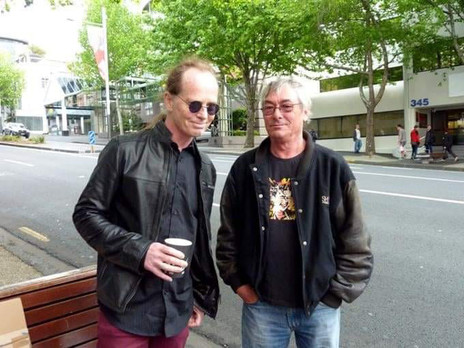
Mike Dooley with Doug Hood outside Real Groovy, Auckland, 2012
The band broke up after a final New Zealand tour in late 1980 and I moved to Melbourne the next year. Our paths crossed only occasionally during my sporadic trips back to New Zealand. So I didn’t see Doug’s subsequent career as a producer, manager and promoter from close up, but even at a distance it was impressive. People trusted his ear and his expertise.
Many years later, I think it was in 2012 when I was in Auckland for a Toy Love LP launch, a friend was driving me down the lane beside the old Real Groovy building searching for a park. Looking out the car window I saw Doug frantically pasting up posters on the wall for some upcoming event. It occurred to me that decades after I’d first seen him giving his all for the band, and after his many roles over the years solving problems and herding cats to get the music out there, he was still on the street making sure the vital, unglamorous stuff was taken care of. That’s what Doug does.
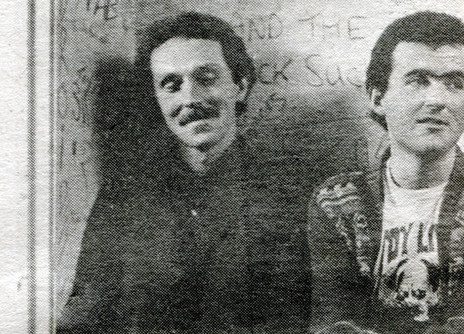
Terry Hogan and Ian Dalziel at Mainstreet, 9 September 1980. - Rip It Up Extra #1
Ian Dalziel: Doug cameos
1. Wednesday February 6th 1980, the start of a national tour. In real rock’n’roll style the band and Doug (and basic back line) are flying to Wellington to perform on a barge (the Kerimoana) off Oriental Bay, with Red Mole and Dennis O’Brien. It was a summer radio promo of some sort. Doug, Chris Moody and I drive to Auckland airport, unload the requisite equipment and once the band have left the plan is to set off driving down country to arrive well before the next night’s gig at the Last Resort. We get back to the truck only to find Doug must still have the keys in his pocket! After much running and frantic wheedling, the Air New Zealand staff came through and managed to get the keys back before take-off. (Perhaps not really the best of stories; these are only Doug cameos really …)
2. Doug was an early adopter of email and the internet, through his work with Aussie promoters Lees and West. The reason The Residents added New Zealand dates to their Australian tour in 1986 (they were in Iceland – or similar – on tour) was because they were so thrilled to get an email from someone in little old New Zealand asking if they’d do it – from Doug. Who knew what those early days of green flickering letters would lead to now – Doug always kept up with the curve (ex-Post Office engineer training) …
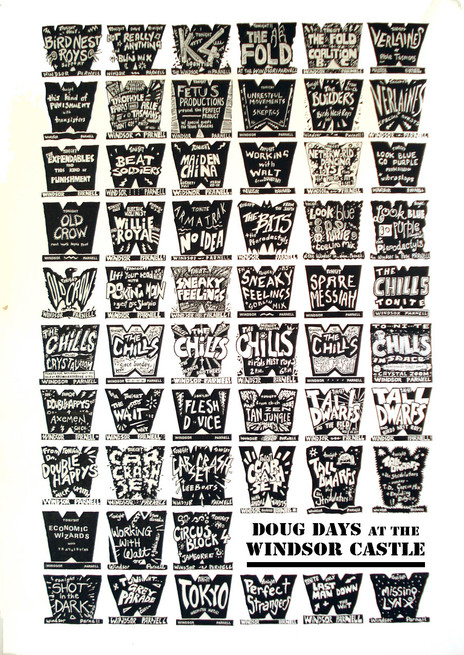
Doug Days at the Windsor Castle. - art by Chris Knox, poster design Ian Dalziel
3. Doug was a centre of calm in often chaotic surroundings. Who else would put together the first Looney Tour and take it around the country! And he booked the Windsor through those halcyon early 80s days – giving many out of town and little-known bands a chance either as headliners or support acts (I did the door for a lot of it as well). Not to mention getting virtually all the Velvet Underground through New Zealand on tour one way, time or another. He has had a big (and largely unrecognised) part in shaping the country’s sonic future!
NB: Heads up at the Official New Zealand Gong Department – don’t forget Doug had a hand in at least two of the records gifted to Australian PM Anthony Albanese by PM Jacinda Ardern recently! That’s gotta be worth an honourable mention in dispatches!
Peace, Ian Dalziel
Roger Shepherd: unfashionable work ethic
Doug had a seemingly unfashionable belief in the importance of having a good work ethic: regular practice, gigging and touring, being busy and getting things done, keeping the wheels turning and the money coming in so it can go out. This philosophy was most sorely tested by the band he spent the most time working with. The Chills had enormous potential and ambition to match, but also an uncanny ability to stumble from crisis to calamity.
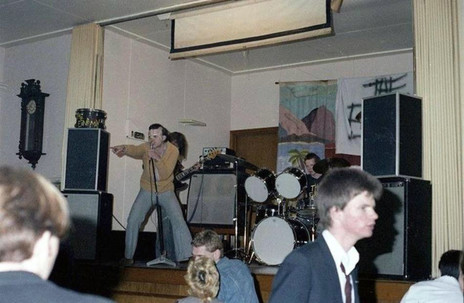
Roger Shepherd in Dunedin, Chris Knox on stage fronting The Enemy, 1978. - Photo by Jeff Batts
Manager in all but name, Doug steered this brilliant band for 15 odd years. Without his guidance and not inconsiderable investment (managers usually take a percentage), the band would never have got to the UK or ever had a shot at getting a major record deal. Unwilling to travel overseas let alone relocate, Doug handed over international management while keeping his hand in on things in New Zealand. The band missed his level-headedness and astute understanding of the music business and its many nuts and bolts.
After Flying Nun moved to Auckland, Doug rented a room from us in the Queen Street offices. He was good for occasional advice, usually unsolicited. Sometimes a single word from Doug could take decades to decipher before making absolutely good sense.
At one stage I sensed Doug might be resentful about not being more formally involved in Flying Nun but the thing wasn’t big enough for someone else at the top of such a precarious project. And Doug already seemed busy enough with Looney Tours. I could judge exactly how busy he was by the number of people walking past my office door to his office each day. The numbers started to skyrocket when he started running the New Zealand chapter of the Big Day Out.
– From ‘The Story of Doug Hood’, Flying Nun website, 12 August 2022
Simon Grigg: shaping the landscape
I can remember the first day I met Doug Hood. It was 20 September 1978, and it was the day The Enemy arrived in town, or so he told me. A black van pulled up outside the record shop in Parnell I was managing, and half a dozen longhairs rolled through the door, with one – a young man in flares and a leather hat – leading the way. This was the band we had all heard so much about, a band that would, within a few weeks, completely upend the Auckland scene. The man in the hat was Doug Hood.
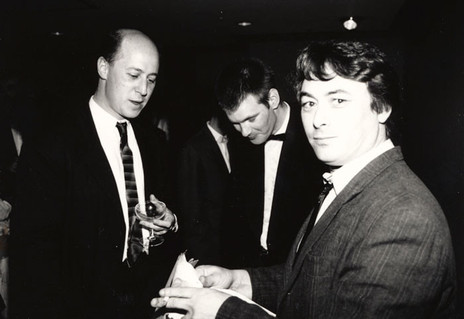
Simon Grigg, Roger Shepherd and Doug Hood at the Apra Silver Scroll Awards. Photograph taken at the Powerstation, Auckland, c. 1990, by Murray Cammick.
The band evolved into Toy Love, and I suspect I saw them play live somewhere between 50 and 100 times. If they played Auckland, I went – and when I went, I was, as often as not, beside the sound desk and Doug.
Our friendship evolved and in the early 1980s that included making records that Paul Rose and I would release on our labels. In the decades since I’ve never had a moment when I didn’t regard him as one of my very best friends and over the years I’ve relied on his friendship, honesty, and intuitive no-bullshit grasp on the real world to get me through more than a few times. There have been moments when that was all I had.
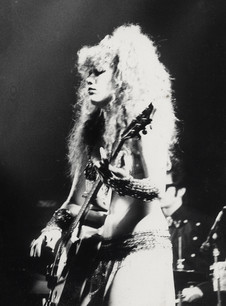
Poison Ivy of The Cramps at the Galaxy, Auckland, 1986. The show was promoted by Doug Hood's Looney Tours.
Taking a wider view too, I don’t think many understand just how important Doug has been in shaping the music we listen to in Aotearoa, the music we make and our musical landscape. For almost two decades, Doug put everything he had on the line over and over, and toured, promoted, and exposed us to music that we might otherwise never have seen, both by touring cutting edge international acts and by adding similarly interesting local artists to those line-ups.
He’s part of the reason student radio sounds as it does, he’s part of the reason many artists we now regard as iconic (yes, awful word, but it works here) and classic are regarded as such. Year after year, he gave us live shows, often as they were being first noticed internationally, and sometimes almost before. He then stuck with these acts to ensure they were embedded. Doug gave us New Order way before ‘Blue Monday’ made them household names, and then he brought them back three more times. He gave us The Fall, The Cramps, Billy Bragg … so many … he was the first to present hip-hop in New Zealand, with Run DMC, gave us the Beasties and then rolled all that, with his Australian partners, into the Big Day Out.
Doug Hood took risks, personal risks, to expose us all to so much and we as a nation will always be in his debt musically.
I think I’m a fan.
Paul Rose: outside the box
I worked with Doug for much of the 80s and 90s. The first time we toured together was in 1983 on the infamous Birthday Party tour, Doug was the promoter and I represented Propeller Records. We got on and worked well together, discovering that we both believe in the mantra, “What goes on tour stays on tour.”
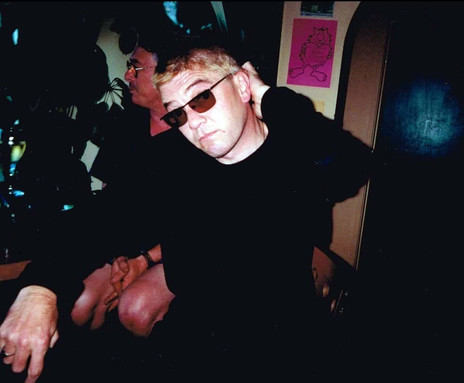
Paul Rose with Doug Hood at Alhambra, Auckland.
Doug offered me some work with Looney Tours and I jumped at the opportunity. We toured the cream of international and local “alternative” acts.
Doug is the best promoter I’ve ever met. His love and enthusiasm for music and musicians is unparalleled. He treats everybody equally and gets on with and earns the respect of everyone from the rock star to the local roadie. A champion of New Zealand bands, a great deal of thought always went into which local act got to support touring internationals.
Because of our close proximity to Australia we toured a lot of acts from across the ditch, with bands such as The Johnnys, Hunters & Collectors and Paul Kelly becoming regular visitors, part of the Looney Tours family. They all loved Doug. Similarly, international acts including Billy Bragg, The Violent Femmes, Sonic Youth and New Order became repeat visitors. They all loved it here, they loved the Looney Tour experience.
One of the highlights of my working career was working with Doug to bring the Big Day Out to Auckland. He did a remarkable job of turning Mt Smart Stadium into a multi-stage festival venue and making the BDO the institution it became.
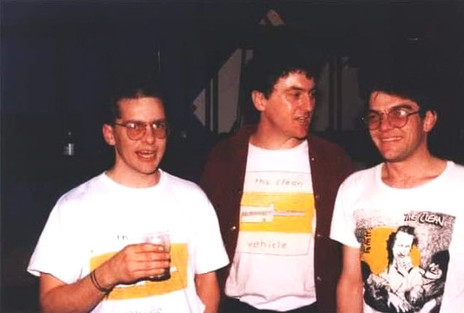
Bob Scott (The Clean, The Bats), Dominic Stones (The 3Ds, Snapper), and Paul Rose.
Doug thinks outside the box, is a great problem solver and is always calm under pressure. If only more promoters were like him! He has made a huge difference to not just the music industry, but to the cultural landscape of Aotearoa. It has been my absolute pleasure to work and play with Doug. The man is a legend.
Trevor Reekie: hands-on work
I was a student at Otago University and played in a band performing original songs at a time when covers bands got the majority of gigs. This changed when I left to live in London and later Nice in the south of France ... this would have been about the time that Chris Knox, who I knew relatively well in Dunedin, was forming Toy Love and Doug Hood was part of that creative wave.
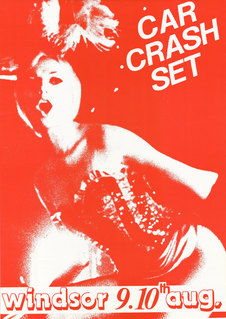
By the time I returned to Aotearoa, Chris was embarking on his TEAC 4-track solo phase and Doug Hood was building a reputation for a variety of skills that would see him become a very successful promoter. I’ve never known Doug that closely but I certainly had a lot of respect for the hands-on work he did promoting, touring and recording some of the international acts he brought over, as well as the original Flying Nun posse.
I was playing in Car Crash Set (a pioneering electronic band) with Nigel Russell at the time and admittedly our musical path didn’t cross that often with Doug and the Flying Nun bunch but we had a lot of respect for those guys. We knew that Doug had a lot to do with that. As time passed it wasn’t unusual to encounter Doug at a variety of shows that included Car Crash playing with Hunters & Collectors, New Order and other bands – these were shows that had high production values and involved considerable professional experience. Doug was a hands-on promoter that brought those ingredients to the table.
My friend Jim Wilson (Phantom Billstickers) frequently said and continues to say that Doug is one of the best promoters in the business and I believe him. Doug has had some health issues in recent times and I wish him well and hopes he regains the energy and acumen that has seen him capitalise on the reputation that he warmly deserves for a career well spent.
Jed Town: love survives
Hi Doug, remember when we first met back in 1983 after returning to New Zealand from Sydney, Australia, I passed on a recording of ‘What’s Going On’? Two years in the making, I realised New Zealand was the place for a record release after seeing your enthusiastic response.
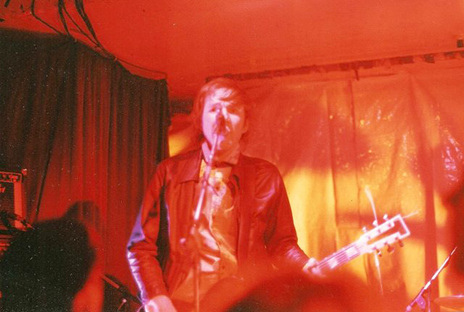
Jed Town - Jed Town collection
Thank you so much for giving me that response. Love is the only real emotion, everything else falls by the wayside, love survives and grows beyond everything. Many people will scorn this belief, saying love is small and insignificant compared to the real issues. But I beg to differ. I’m sure you know these realities, Doug, we can laugh in the face of politics, hatred and anything else, except the peace that love brings in return for our service towards it.
All the best my friend, may the grace be with you.
Yours faithfully, and with friendship, Jed Town, musician and peace campaigner.
Martin Phillipps: infectious spirit
I first saw Doug Hood when he was singing for The Clean, supporting The Enemy, in Dunedin in 1978.
I got to know him soon after when he was working with Toy Love and while I was still in my first band, The Same. He has been a friend ever since.
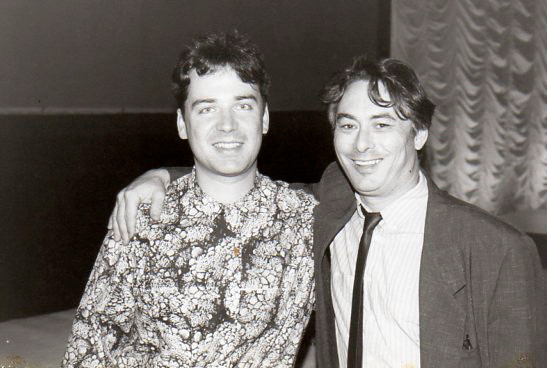
Martin Phillipps and Doug Hood.
After he and Chris Knox became involved with the fledgling Flying Nun label, as a marvellous creative pair, they oversaw many of our first recordings. It soon became obvious that it would make sense if Doug also became our first manager.
He instilled a good work ethic in all the bands he toured around the country during the Looney Tours days and he made certain that The Chills saved enough money for our first excursion overseas: to London (and Brighton) in late 1985.
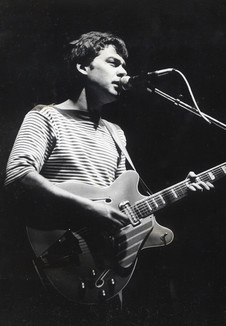
Martin Phillipps, The Chills, The Gluepot 1986, Looney Tours.
He accompanied us and it was fun and very successful in spreading the word about The Chills and the whole independent New Zealand music scene. But Doug was wise and gracious enough to realise he was not ready to manage us on an international level and he was relieved to be able to place us in the care of our next manager, London-based Craig Taylor (ex-Dunedin) who was already deeply involved with the UK music industry. There are few managers who would let go of their artists for the good of the artists’ careers and I thank Doug for that.
But Doug did remain involved and we had many adventures in London and Australia and, later, in Los Angeles. I remember we were sitting in the bar at our hotel in LA making plans when we were approached by Flavor Flav who told us we were included on his tab for drinks. Doug didn’t remind him that they’d already met when Doug toured Public Enemy in New Zealand.
But I recently reminded Doug that sitting at that bar on the same night, in a fully patched Hells Angels jacket, was someone I later realised was their president, Sonny Barger, who I now think was possibly meeting a publisher to discuss his upcoming autobiography. Weird things happen on the road.
Doug also made sure that everyone had fun! Occasionally too much, but he has always had that rock and roll spirit – and it is infectious.
There are so many memories – some lost and some found again.
Always in my heart, Doug invited me into his family and he was also one of the first to really believe in me and The Chills – and he still does.
Terry Moore: quietly making (really big) things happen
It might seem strange that I would find Doug’s feet would be so memorable. When The Chills first made it to the UK, it was a low-budget affair in the midst of winter. Craig Taylor had graciously accommodated some of us in his London home. Doug and I shared a small, cold, damp, backroom with two paper-thin mattresses on the floor. To maintain some level of decorum we had decided to top-and-tail. For several months I would awake each morning completely frozen, staring at Doug’s socked feet.
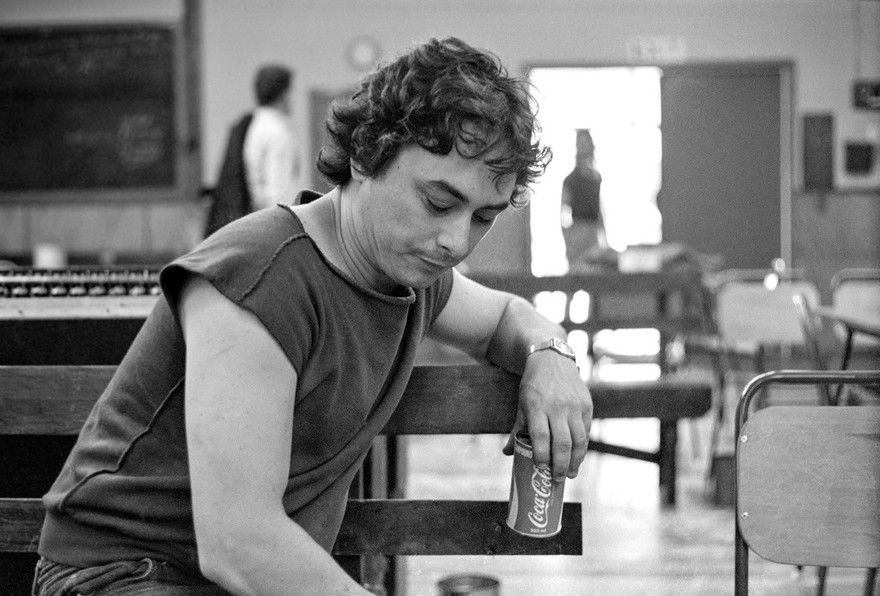
Doug Hood, contemplative. - Photo by Terry Moore
Both of us being there was the result of his influence and genius from the early days of The Enemy, through to managing bands like The Chills from the obscurity of places like Dunedin to the international stage, and his later forte of bringing the world to New Zealand.
He and Chris Knox had recorded the Chills’ side of the Dunedin Double album at Paul Kean’s house in Christchurch. On our first trip to Auckland he was there recording ‘Rolling Moon’, he was behind the live Rumba Bar recordings, and ultimately was there for the ‘Pink Frost’ recording at The Lab and the final mix at Progressive.
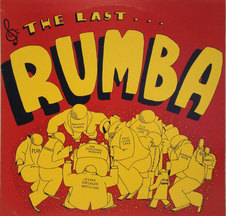
The Last Rumba, a live album released by Flying Nun in 1983, recorded by Doug Hood and Terry King. Cover by Ian Dalziel.
On returning to Dunedin after that first Chills’ Auckland trip, we all struggled through Martyn Bull’s illness and eventual passing. I ended up taking a break from The Chills. Martin assembled a new line-up.
I knew Shayne Carter from Bored Games and flatted with Wayne Elsey when they started the Doublehappys. When Doug put the 1984 Looney Tour together, I went primarily to do the sound for the Doublehappys, but also as unofficial photographer, encouraged by Murray Cammick at Rip It Up to document this improbable circus as it made its way across New Zealand.
The Looney Tour consisted of four bands in a ragtag collection of transportation going from town-to-town, all coordinated by Doug and David Merritt. Andrew Frengley’s lorry carried all the Livesound PA and band gear, the musicians, crew, and “friends and family” were distributed over some dubious Hiace vans, a vintage Austin, and even a Honda CB750 motorbike. As far as I recall, everything went mostly to plan – every show was held, punters were enthusiastic, and there were amazing after-parties that my camera somehow failed to record.
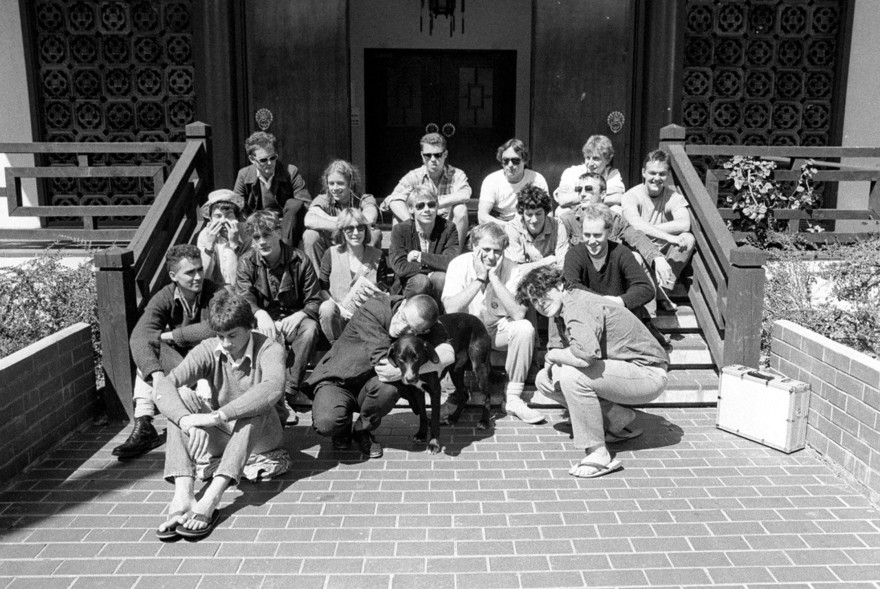
Looney Tour 1984, with Doug Hood wearing shades in the back row, second from the right. - Terry Moore
Accommodations were mostly in the venues we played at (pubs) or rudimentary hotels nearby. It was not a money-making venture by any stretch. It was a really hard slog. There were grumbles about money, the order of the bill, and who closed the night. Ultimately everyone got on and some lifelong friendships were forged.
I took a bunch of photos of the tour. Some were published in Rip It Up, others I lost along the way. Those that I still have were in storage for 20+ years before the Chills documentary paid to digitise all my 35mm BW negatives. Although they are not complete, what is left does document something that Doug’s genius conceived, pulled-off and is now legendary.
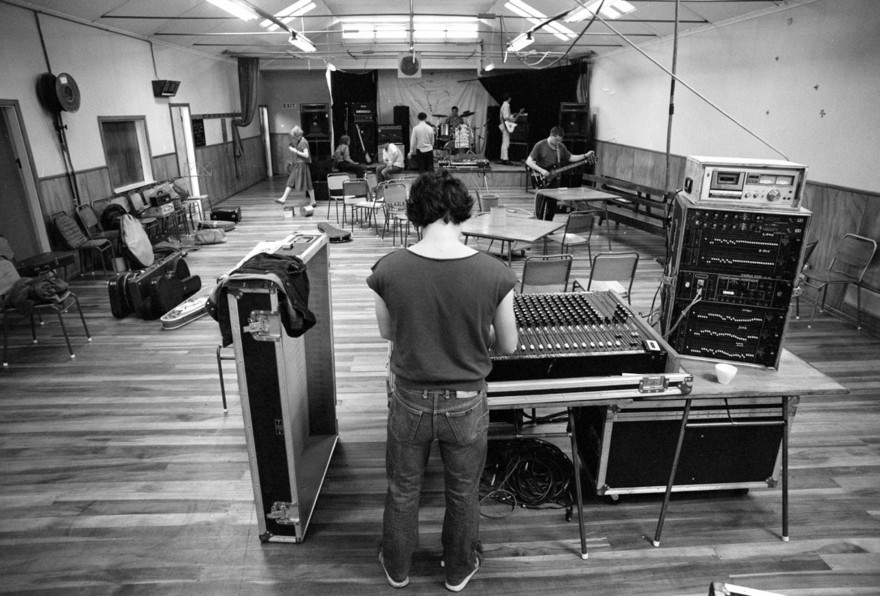
Doug Hood gets ready for soundcheck. - Terry Moore
Over that tour Doug quietly (and not so quietly) encouraged me to re-join The Chills. That eventually happened. Later, after many Windsor Castle shows, and – embarrassingly – two “bon voyage” New Zealand tours, we had enough money to get to London and me facing Doug’s feet!
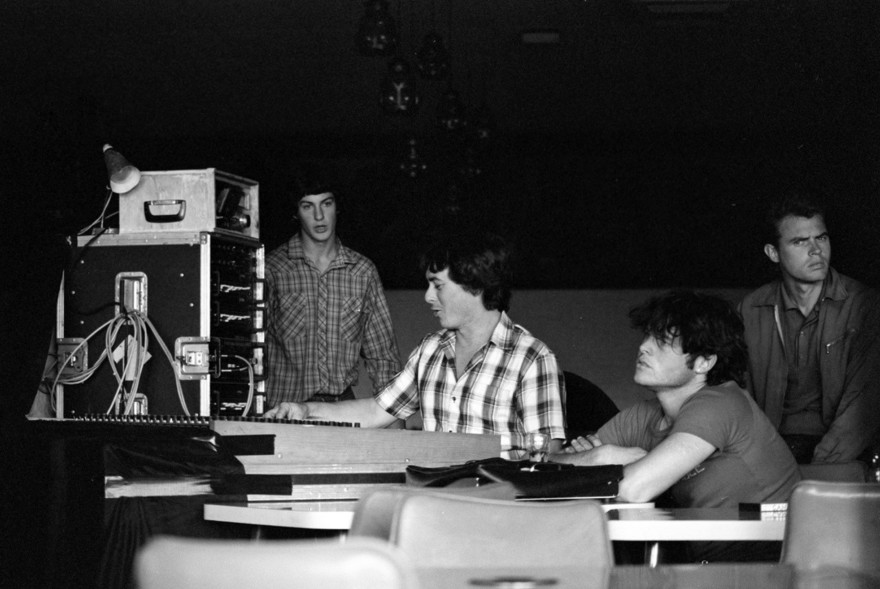
Doug Hood at the mixing desk with, from left, John Collie, Rex Vizible, and Michael Kime. - Terry Moore
It’s been some 20+ years since I moved to the US after my final stint in The Chills ended abruptly in New York. Doug pulled some strings and made my landing here successful. There is so much in New Zealand music that would never have happened without Doug. Personally, I am forever in debt to him.
Jay Clarkson: the legacy continues
In their short but glorious reign Toy Love played Christchurch several times, and The Playthings would more often than not open for them there. Doug Hood was their sound man and tour manager. I found working with him in his professional capacity as a sound engineer always to be smooth sailing and no fuss – even when there were hiccups with sound equipment.
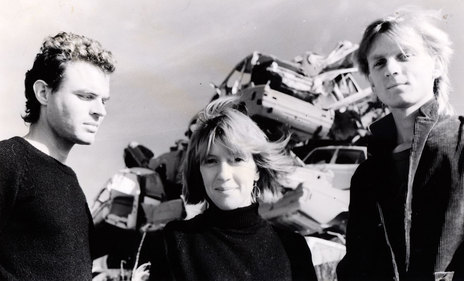
The Expendables - Michael Kime, Jay Clarkson, Robert Key
Courtesy of Doug, two They Were Expendables gigs I particularly appreciated playing were opening for Hunters & Collectors and the Violent Femmes in Christchurch. One to look after his visiting bands before, during, and following a gig, Doug had us dine out with the Violent Femmes and then on we all went to Dux de Lux to catch a band. And a very convivial time was had, chatting post gig with Hunters & Collectors in the back bar at The Hillsborough. Lovely people all. He had Breathing Cage open for the Neville Brothers at the Christchurch Town Hall and again – what super people.
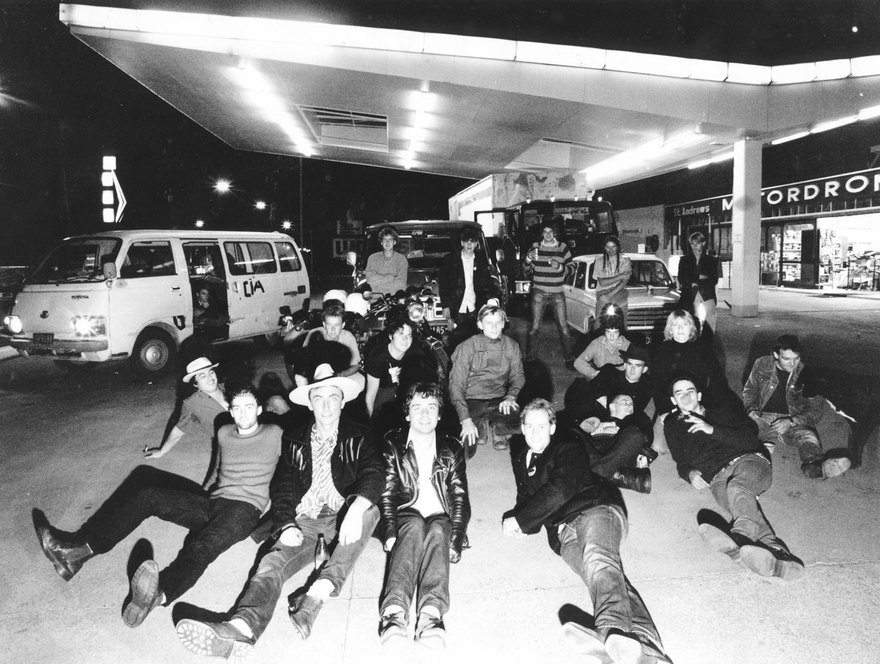
The Looney Tour hits the road, February 1984: Doug Hood, left, in hat, Jay Clarkson sitting in the back row, second from right. - Photo by Terry Moore
The early 80s Looney Tour, with Doublehappys, Children’s Hour, The Chills and The Expendables was a fantastic three weeks on the road, gigging all round New Zealand.
It was a smooth operation considering the numbers travelling. One sweet little memory I have is from New Plymouth. We were staying at the White Hart Hotel and the bands had gathered in the upstairs lounge for a what’s-next tour meeting. The seats were in rows and I was somewhere in the middle, knitting. Doug arrives and the next thing I hear him shouting out “Are you knitting, Jay?” and he’s got this great big happy smile on his face. “Good on you!” Hah! Not many guys who would say that.
Though I didn’t let on, Doug, I was actually a bit daunted when you asked me to whip up on stage and tune John Cale’s guitar – given he was due to walk on any minute! However I didn’t drop it or break a string and all was well. And what a show that was.
So many shows you bought out. You upped the concert experience for audiences throughout New Zealand, and the mutual respect shared by the New Zealand and international “alternative” musicians (most of them, anyway!) surely enriched the creativity of both – and its legacy continues.
Shayne Carter: uncovering the good stuff
I’ve always felt a great loyalty to Doug, because he’s always been very loyal to me, right from the time Bored Games slotted into the bottom of the bill to support Toy Love at the Dunedin concert chamber when I was 15. My second-ever gig. My first was the high school talent fest when the principal walked out. The only time I ever saw Doug be uncool was when him, Paul Rose, Steve Morice and I went to the World Cup Cricket semi-final between Australia and New Zealand – the one eons ago where Martin Crowe smashed a century – and the scoreboard broke down so Doug, Paul and Steve, all pissed out of their gourds, joined in the chant of “The scoreboard is a wanker.” But as far as being uncool goes, that’s about it.
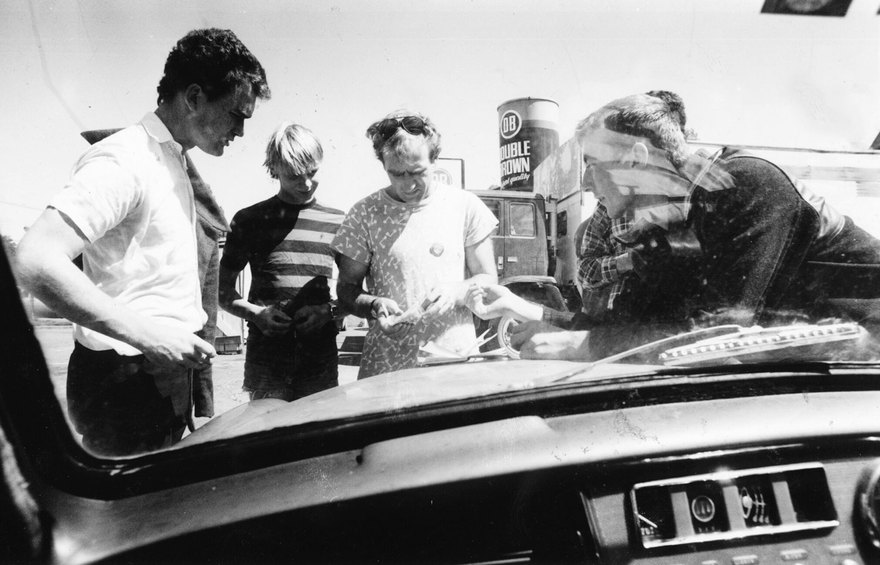
On the Looney Tour - the late Johnny Pierce (Children's Hour), the late Wayne Elsey (Doublehappys), Dave Merritt (tour manager), Bevan Sweeney (Children's Hour), 1984 - Photo by Terry Moore
It was Doug who put the Doublehappys on the bill for the nationwide Looney Tour with The Chills, Children’s Hour and The Expendables when we’d only played one gig. Him and Chris Knox had really dug a demo we sent done with our drum machine Herbie Fuckface though, and I guess they had a vague knowledge of the characters they were dealing with. Straitjacket Fits played at Doug’s wedding.
It was Doug who ensured that SJF got a primo sunset slot at the 1994 Big Day Out for our final ever gig. Doug has always had my back in an often unpleasant and disloyal industry. I don’t know how many sweet support slots he got for me or my friends’ bands.
He was one of the main facilitators in dragging the New Zealand music scene out of the dark ages when anything left field was considered illegitimate or a joke. But he could see where the gatekeepers couldn’t. He helped uncover the good stuff because he knew it was true. Doug is a cool guy, end of story. If we’re going to hand him his flowers then I’m at the front with a bunch.
Russell Brown: the practical and the aesthetic
Cultural movements all have their figureheads, their legends, and their special places. But the ones that stick invariably have someone who does what needs doing so that all the rest happens. For so many years in New Zealand, that someone was Doug Hood.
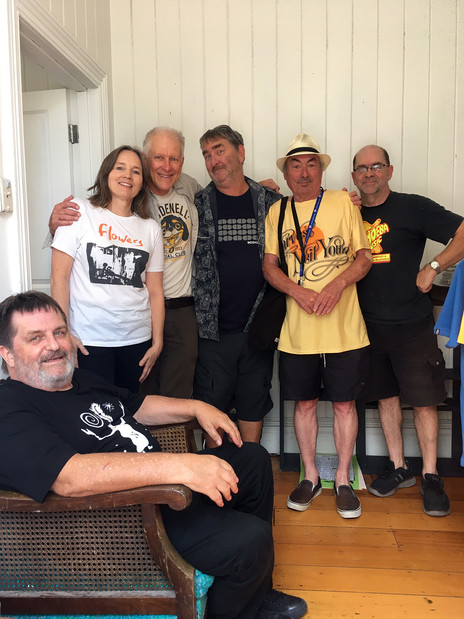
Doug Hood and Russell Brown (centre) with The Bats, 6 March 2020. - Paul Kean collection
When no one really knew how anything worked, Doug was a quick learner. Would The Enemy and Toy Love ever have been able to surge forth from Dunedin without Doug putting together and operating a PA system? Would there have been a manager who understood what was going on with Toy Love had not Doug also stepped up as their manager?

Looney Tours monthly menu - Book of BiFim, August 1986.
When I first met him, the Flying Nun phenomenon was taking shape, a lot was already revolving around Doug – and he seemed to handle it all with a perpetually even temper. He was working for Livesound, a sound company, but someone needed to manage tours for these young bands, so he took what he’d learned and did that too. When The Chills made their first foray to Europe, Doug was there as their manager.
The chance came to tour The Fall here. He did that, then formed Looney Tours to bring a string of influential artists here. The Birthday Party, Violent Femmes, John Cale, Nico, the Go-Betweens, the Hoodoo Gurus? Doug did that. Early on he’d pick up the bands from the airport in his crappy little second-hand car and bring them to the place in Summer Street where he lived with Chris Knox and Barbara Ward. He made it, with Barbara’s considerable patience, a social and musical nexus. He even made one-day cricket fans out of the Femmes.
When Chris and Barbara moved in to their Grey Lynn home it was, of course, Doug who managed the operation, rewarding his team of volunteers with periodic “production meetings”, from which we’d walk away energised and a little dazed.
Later, of course, he developed the relationship he’d formed with Vivian Lees and Ken West and brought the Big Day Out here.
But it would be a mistake to think of Doug as just the guy who could run the PA, pack the truck and be trusted with the door take. Right from the beginning, his contribution has always been aesthetic too. A string of absolutely fundamental New Zealand records – including The Clean’s Boodle Boodle Boodle – sound the way they do because Doug was there to realise the ideas. His soundman’s ear made them as direct as they are and he heard what the music was.
Even more recently, as his health has given him some trouble, Doug has stayed engaged with what he helped create. If there’s a Nun event or gig, Doug will be there if he can. And he’s always shared what he knows with those who came after him.
To put it mildly, we owe Doug Hood a lot. For his skill, his enterprise and, really, for just being Doug.
Colin Hogg: making it happen
Doug and I spent a lot of nights standing side by side looking at bands. Never a small-talker, Doug would generally offer a wise word, or maybe a few more. “Crap.” “The bass player’s alright.” “That’s a good song.”
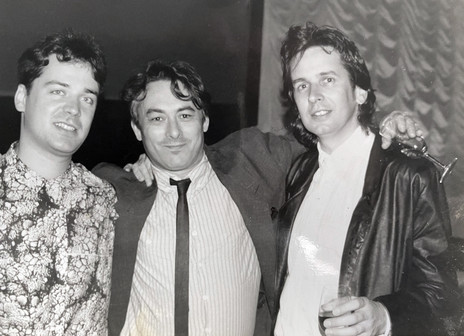
Martin Phillipps, Doug Hood and Colin Hogg. - Colin Hogg collection
We were neighbours too, in Grey Lynn, way before the gentrification. Chris Knox was also a neighbour. It was the 1980s and we all had our teeth at different angles into the local music scene. It bound us and the bonds hold to this day, 40-odd years later.
I always felt we – and many others – were all actors in a great piece of theatre involving the birth of a new age of New Zealand music. Of we three neighbours, I was the least important, a music writer. Chris was music itself and Doug the most important, the one who helped make it all happen.
He’s got good ears and he knows what he likes. He liked The Chills so much he managed them for 12 years, which might be a record in dedicated New Zealand rock band management.
He moved from helping scruffy bands get their gigs together and their songs recorded to being quite a wheel in the bigger music business. But Doug was a modest wheel, never a flashy dresser nor a seeker of fame. I think he liked the early days best, when everyone was fizzing with possibility, all pointed in the same direction.
His favourite Chills line-up was the first one. His favourite drink was the next one, but that went for most of us. We had such times together, I wish I could remember them. Or at least remember some that I could repeat without risking arrest.
I asked him the other day why he stuck so long with The Chills. “Loyalty,” he said.
Janet Dawes: work, life, friendship
Doug was the promoter of choice for many of the indie labels, band managers and agents I worked with while I was label manager at Mushroom Records NZ, circa 1988-91. He was a music lover, loved the industry, loved to talk about what would sell and how to sell it.
“Hunters are coming back …” “Johnnys are on …” “What are you doing with Sugarcubes …” “I’ve told bFM to give you a ring …” “Paul Kelly. What do you reckon? …”
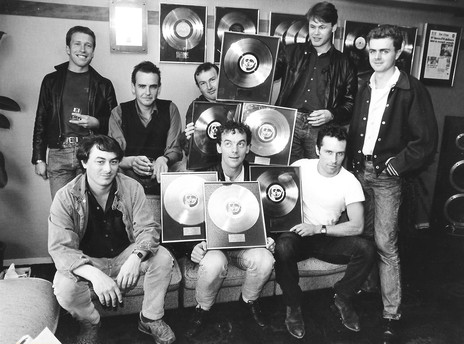
Doug Hood (front left) at a presentation of gold albums to Hunters & Collectors, held at Festival's Auckland office. - Janet Dawes collection
Lines between work, life, friendship blurred as will be the case for many in Doug’s orbit. Plans would be made on the phone from Queen St, in the back bar at the Galaxy, at the Festival offices in Carlton Gore Road or at Hakanoa Street, Grey Lynn.
Grey Lynn is the scene of one of my favourite Doug stories. The Go-Betweens found themselves in a motel off Williamson Ave, Grey Lynn, as they landed in New Zealand for their 16 Lovers Lane album tour.
I needed to go and meet up with the band on their arrival, at the motel, to go through the tour promo schedule.
The album is one of my favourites still, however there was some pressure, it being their first for Mushroom. There were tensions in the group, and there wasn’t much money in it for anyone.
It was Bluff oyster season in New Zealand. “I know,” suggested Doug, “why don’t you bring oysters with you. Bluff ones. Super fresh. They’ll like that. And wine … they really won’t be expecting that.”
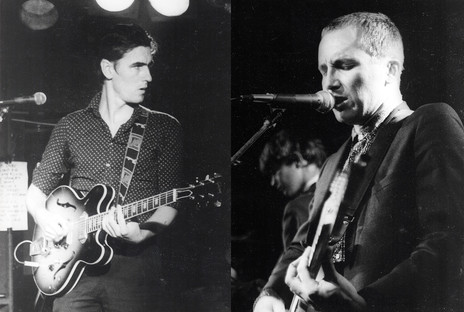
The Go-Betweens' Robert Forster and Grant McLennan performing at the Gluepot. In the background is bassist Robert Vickers, who would later tour and record alongside Hamish Kilgour in The Mad Scene. - Doug Hood collection
I got to rock up with food prepped at home, fresh brown bread and butter, lemons, trays of Bluff’s finest and chilled white wine, ready to serve. We all ate and drank standing up in those tiny rooms as there really wasn’t much in the way of furniture or elbow room. It was late morning, mid-week. Best start to a tour relationship ever.
Typical Doug. It was an icebreaker, X factor, easy and practical. We covered a lot of ground in those couple of years, and are still family, decades on. Such a great person to have been there, to help me to navigate that start of my career.
Nick Sampson: on a mission together
Doug did always do it for love. Ask anyone he helped. It wasn’t done for self-interest, rather because he felt it needed to be done. So many of us owe so much to him.
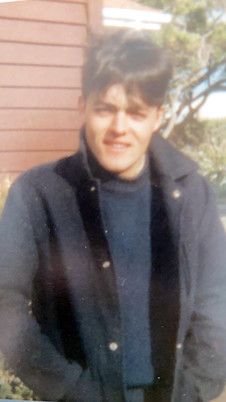
Nick Sampson.
When the Netherworld Dancing Toys first ventured up to the big smoke we encountered some shady types who held a lot of power. We were plucky, but we’d have been lost without Doug’s kind and savvy advice. As well as booking us gigs at the Windsor Castle, his help meant we were soon self-managing nationwide tours. Booking venues directly and travelling with a big PA and lighting system, hired at an affordable price from Livesound – the company Doug helped run, making it possible for bands to tour and make a living.
He did all of this for what he genuinely saw as a worthy cause. We were all on a mission together, his role helping, mentoring and making stuff happen. He wasn’t “in business” as such, often to his own financial detriment.
Doug also enabled many young, underfunded acts to get into studios with like-minded people. He helped the NDTs again when he introduced us to newly established Virgin Records (NZ), which ironically led to us leaving Flying Nun. But even after we’d done The Real You EP on Virgin, he organised for us to demo ‘For Today’ and what became the Painted Years album for “mates rates” at Progressive Studios with Terry King.
He’s damn good fun too – there were hilarious BBQs at the famous Hakanoa Street home he shared with Chris Knox, Barbara Ward and Ian Dalziel. Great times.
We didn’t pay Doug for a lot of the “extra” stuff he did. He didn’t want that, he’d just say “buy me some beer”. Doug just wanted to help, and he did, hugely.
Adam Holt: respect
I can’t remember when I first met Doug because in my mind he has always been there. His influence and presence is like no one else’s – he was there at so many of the most important moments of New Zealand music history. Without him those moments wouldn’t have happened, those definitive recordings would not have been made and those iconic shows would never have been witnessed. Doug always made a difference, and he was always the most generous and supportive person you could have the good fortune to meet in your life.
I must have seen him first behind the mixing desk at a Toy Love gig in 1979 or 80 and at shows around Auckland, through 81 and 82. I think I got to know him properly in 83/84 when he ran the PA at The Windsor Castle where we used to play. Those early 80s weekends at the Windsor were heady times and Doug was the virtual conductor of the post-punk orchestra we were all part of.
Doug always seemed unbounded by a job description – singer, sound guy, critically important record producer and a promoter who shaped a generation’s taste in music.
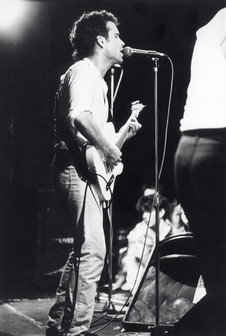
Mark Seymour, Hunters and Collectors, Gluepot 1986 (Looney Tours).
As much as I love New Zealand music, the Australian sound of the 80s runs deep in my veins and that is down to Doug touring the Hoodoos, Hunters & Collectors, the Go-Betweens et al so regularly in New Zealand.
I was working in a record shop in the mid-80s and Doug always looked after me with backstage passes and after-party invites. I remember a party Doug threw at his house in Grey Lynn after the Hunters show at The Gluepot where Mark Seymour and some of the band were singing an a capella version of ‘Respect’ in the corner. Pure joy. Mark Seymour talks about that Gluepot show in his autobiography. The band were just about dead after hitting the wall in America and it was the raucous Kiwi reaction from a packed Gluepot that completely re-energised them and brought them back from the brink. That was Doug helping out a bunch of hard-working musicians once again in his usual, unassuming way.
I love how I still see Doug, have a drink with him at the pub, talk quietly about the old days and tell each other how proud we are of our kids. That’s Doug, still modest, still passionate and still a very special man.
Stuart Page: alternative renaissance
Much has been written about the rightfully lauded 4-track recordings made by the Hood/Knox duo in the 80s, exemplified by The Clean’s instant classic EP Boodle Boodle Boodle. Doug Hood was a true Kiwi self-taught audio engineer in the DIY New Zealand alternative renaissance.
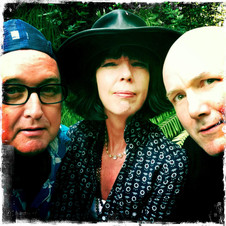
Stuart Page, Jane Walker, and Jed Town, Titirangi, 2011. - Stuart Page
Doug went on to become a promoter, at first with his Looney Tours featuring Flying Nun bands, but he also brought in some overseas acts such as The Birthday Party, Nirvana and The Fall, and of course the early Big Day Out festivals, where we were treated to The Breeders, Smashing Pumpkins, and many others. Doug enabled me personally to see gigs by The Residents, The Cramps, The Pogues, Jesus and Mary Chain, Sonic Youth, Dinosaur Jnr, The Buzzcocks, Jonathan Richman, Butthole Surfers and Iggy Pop, to name a few.
One particular show I’ll never forget was the Butthole Surfers at the Powerstation, Tuesday 13 and Wednesday 14 March 1991. I’d been projecting 16mm film for acid house parties and rock gigs, so Doug calls up. Would I be interested in running the Butthole’s film projection for two nights at the Powerstation? Say what? Would I ever! I had two grunty 16mm Xenon projectors with anamorphic (widescreen) lenses delivered, and Doug introduced me to Gibby Haynes who handed over a stack of 16mm films in hard cases. They were labelled with various US military and university libraries etc, so I gathered that they’d been liberated at one time or another and recruited into the band’s touring arsenal.
Titles included Dangers of VD, Penis Surgery, Russian Military Parade, Charlie’s Angels, and various others. Gibby insisted that I could show any two films side by side as I wished. They were in a bad state and I spent a few hours with a splicer fixing them up, and the show was on!
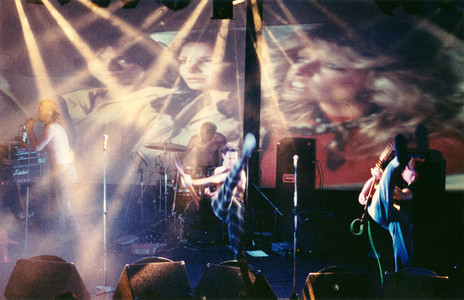
Butthole Surfers, Powerstation, 1991 - Looney Tours - Stuart Page
Needless to say it was a wild and mind-blowing couple of nights, the bizarre juxtapositions of the bright film projections adding to the already exciting, unsettling sounds of the band, with Gibby’s on-stage rack of effects and electronics rivalling that of the FOH engineer. I couldn’t believe my luck that thanks to Doug, I was working as projectionist for the Butthole Surfers, getting paid to see them for two nights.
There were a couple of gig reviews that didn’t share my enthusiasm for the shows, and particular note was given to the obscene projections, so I figured I’d done my job well. So, thanks Doug for a very memorable couple of nights!
Murray Cammick: Doug’s rule
When Doug’s company Looney Tours started representing overseas promoters in New Zealand, he would make sure that a local New Zealand band had the support slot. Where the acts were not “alternative” he’d find local hip-hop or heavy rock bands to open for foreign acts in those respective genres.
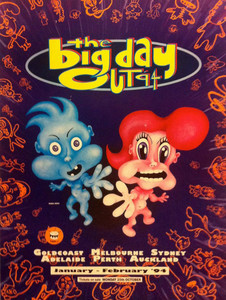
Poster for Big Day Out 1994. "Hello Auckland!"
As the New Zealand representative for the giant Australian summer tour, the Big Day Out, Doug made sure that a large number of New Zealand acts got to share the big stages with the overseas acts. Kiwis were not just confined to the smaller side stages. Doug didn’t just book Flying Nun acts on the foreign tours, and the first Big Day Out had seven acts from another New Zealand indie label.
While Australian band managers wanted their own acts to play the Auckland Big Day Out and help them to “break” into the New Zealand market, Doug resisted the threat of an avalanche of bands being flown across the Tasman to Auckland and made sure that the Kiwi bands got important spots on the Mt Smart Stadium stages, to promote or “break” their own music.
I am not sure whether there was an effective, long-term “union rule” that New Zealand acts had to open for touring acts playing in New Zealand but I am sure that there was “Doug’s rule” and he stood up to the foreign touring companies and made sure that locals got their chance on the big stages that he booked.
Jan Hellriegel: in your corner
Navigating the music industry as a young woman in the late 80s was interesting. Even though there weren’t many of us and it was fraught at times, there were many supportive people and one who will always remain firmly etched in my heart, with a lot of gratitude, is Doug Hood.
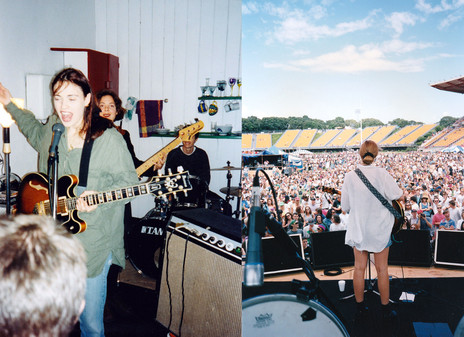
Jan Hellriegel playing with Cassandra's Ears in a Dunedin kitchen, 1980s; and performing as a solo artist at Auckland's first Big Day Out, 1994.
Doug was a promoter when I met him at a George Street party in Dunedin. It was above some shops and I was surrounded by my musical heroes, so I was feeling a little out of my depth as I cowered in the corner sipping on a beer. My band, Cassandra’s Ears, was fledgling and I can’t even say we were that good when we started, so I felt very invisible and was relieved when Doug came over to talk to me. He probably doesn’t remember, but I do.
He asked me about my band and what we were up to and promised us a few support slots. When you are feeling inadequate it’s good to have someone in your corner. He was always like that.
The Ears had some extraordinary breaks supporting bands such as The Hoodoo Gurus and The Johnnys. These were small pub gigs but they really helped us get better at what we did as we honed our skills. It was Doug that put us forward for these shows and as I understand it he got me the spot at the first Big Day Out in Auckland in the 90s. I don’t think I have been invited to play any music festivals since.
Thank you Doug, for everything you do, for being interested and listening and all the opportunities you sent the way of local musicians. There are a lot of good people in our industry and you, my man, are one of the champions.
Campbell Smith: art over commerce
I knew about Doug Hood long before I met him, and particularly of his critical contribution to the nascent Flying Nun scene in the 80s.
As I began working on the outskirts of the music industry in the early 90s, hanging around bFM, sucking up all the knowledge that I could about who did what and when, Doug’s name came up constantly. He seemed to have a hand in so many iconic bands, moments and events.
So I was a bit in awe of him before meeting him. But when I did, I found a very genuine, affable, charming man, who could and would talk your ear off. He had and has a wealth of stories about so many musicians and music industry folk. He remembers everything.
It was also apparent from the outset for me that he was very clever, intuitive and creative as a promoter. When we first properly connected he was Looney Tours and just launching the Auckland leg of the Big Day Out, and really in it for the art not the money.
Like so many of the “art over commerce” purists, he was also kinda loose. I remember having to explain to him that the newly introduced GST system was not a gift, a means for him to add 10% to his income, it was a tax to be collected and paid on to the government. His bookkeeping generally just involved writing a few scribbles on the butt of his cheque books.
For me, Doug Hood is a largely unsung legend of the New Zealand music industry, especially as a promoter. He is up there for me with people like Ken West, promoters that I think of as pure visionaries. Doug was that, but he also was and is a kind and honourable gentleman. That’s a rare combination.
John Russell: travelling companion
Doug and I first crossed paths in May 1990, following a Sugarcubes concert at the Auckland Town Hall, when he ejected me from the backstage area after I had snuck in to try and meet Björk. Several years later the two of us would “sneak” into a Faith No More concert he was promoting at the North Shore Events Centre. Doug had left his Access All Areas pass at The Sequel office in Queen Street, only discovering this as we stumbled towards the venue. Without breaking stride, Doug pulled his hairdresser’s business card from his wallet, flashed it at the security crew, and minutes later he was standing at the backstage bar with a six-pack of Mac’s Gold under each arm.
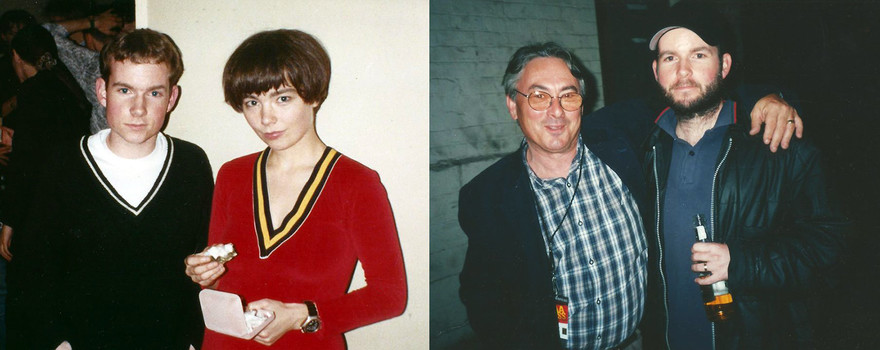
John Russell with Björk at left; years later with Doug Hood at right. - Anneliese Stunzner collection.
There is never, ever a dull moment in Doug’s company and being alongside him always feels like coming home. His extraordinary humility, his understated wisdom, his generosity, his warmth, his forgiveness, his laughter and his unbridled enthusiasm for a long lunch are only a few of the reasons why it is so joyous to be by his side. Doug and I spent a lot of time together – as William Blake once described it – on “the road to excess” and he is the best travelling companion I’ve ever had. Drunken afternoons at the Shortland Street deli, at the short-lived rugby museum in the Chase Plaza, at Tony’s steak restaurant in Wellesley Street and, best of all, late nights at the bach in Hahei that turned into early mornings, listening to The Chills and Paul Kelly until the sun came up.
As a Flying Nun fan, I will always be in awe of this great man, who made an immense, immeasurable and invaluable contribution to the musical landscape of Aotearoa. But more importantly, I am so fortunate to have this great man as a friend, a mentor and a partner in crime. “Deep and dark my submarine bells groan in greens and grey, mine would chime a thousand times to make you feel okay.”
--
Read more: AudioCulture’s profile of Doug Hood, by Andrew Schmidt
--
Contributors
Alec Bathgate was a member of Toy Love and the Tall Dwarfs
David Kilgour is guitarist with The Clean
Paul Kean is bassist with The Bats, and formerly with Toy Love
Terence Hogan was Toy Love’s connection at WEA NZ, and is now a Melbourne artist
Ian Dalziel is a Christchurch graphic artist who worked for Toy Love, Rip It Up and Looney Tours
Roger Shepherd is the founder of Flying Nun Records
Simon Grigg founded Propeller Records and AudioCulture
Paul Rose was a partner in Propeller Records and worked for Looney Tours
Trevor Reekie founded Pagan Records and now contributes to RNZ
Jed Town is an Auckland musician, formerly with The Features
Martin Phillipps founded and performs with The Chills
Terry Moore played bass for The Chills, is a photographer and New York-based sound engineer
Jay Clarkson is a singer and songwriter, formerly with The Expendables and Breathing Cage
Shayne Carter is a Dunedin-based musician, formerly with Bored Games, Doublehappys, Straitjacket Fits and Dimmer
Russell Brown is an Auckland-based journalist and broadcaster
Colin Hogg is an Auckland-based writer, formerly music editor at the Auckland Star and NZ Herald
Janet Dawes was Mushroom Records NZ’s label manager in Auckland in the 1980s
Nick Sampson was a member of the Netherworld Dancing Toys, and currently makes music with Dirt
Adam Holt, formerly of The Ainsworths, is chairman of Universal Music NZ
Stuart Page is a photographer and member of AXEMEN
Murray Cammick, photographer and writer, founded Rip It Up, Wildside and Southside Records
Jan Hellriegel is an Auckland singer and songwriter and music publisher
Campbell Smith is an Auckland based lawyer, band manager and promoter, and former chief executive of the Recording Industry Association of New Zealand (RIANZ, now Recorded Music NZ)
John Russell is a Whangarei-based journalist, formerly editor of Real Groove and assistant editor of Rip It Up